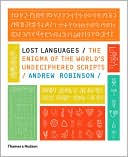

 |

|

The average rating for Lost Languages: The Enigma of the World's Undeciphered Scripts based on 2 reviews is 4 stars.
Review # 1 was written on 2012-08-15 00:00:00 Jennifer Mcdaniel Jennifer McdanielI enjoyed this brief overview of many of the world's undeciphered scripts. Some of these I had not heard of, or had heard very little about, such as the Phaistos Disc and the Zapotec and Isthmian scripts. It was an easy read and the stories flowed well. I enjoyed Andrew Robinson's commentaries and opinions. At times he tells you to try to figure a problem out by looking at a picture or chart. (I never did spend time figuring any of it out, I just kept reading for the answers.) Because of all the different scripts mentioned in the book, there isn't a lot of detail about any of them. It's a good introductory text. I have read several books about the Maya hieroglyphs (all reputable) and I might explore more books that talk about some of these scripts in more detail. I'll have to be careful - it sounds like there is a lot of information published about these scripts and not all of it can be trusted. This book is copyrighted in 2002 and I'm curious to know if anything new has been discovered or if any more progress on decipherment has been made in the last 12 years. I was disappointed in all of the typos in the book. That does not, of course, affect my rating, but it was frustrating to read a non-fiction book on language that was not adequately proof read! |
Review # 2 was written on 2012-11-13 00:00:00 Muthukumaran Rangaswamy Muthukumaran RangaswamySome times ago, james-nicoll asked what got people interested in steampunk ("Pretty pretty brassworks?" he asked "An English boot, stamping on the face of humanity forever?"). For me, as I've written in the past, my interest in steampunk-type scenarios comes mainly from my interest in the unexpected congruencies between past and present informational environments, in the possibility that the world could have been more information-dense, that there would have been more left of the world for us, if only things went differently. The ultimate insofar as this sort of thing is what Wikipedia calls undeciphered writing systems, the dozens of different scripts--alphabetic, pictographic, and otherwise--used by peoples far back in the past which contain information of some sort that's unknown to us. These scripts could contain almost anything, from the powerful epic of Gilgamesh revealed once Sumerian cuneiform was deciphered to the mundane palace records found to be encoded in Mycenean Greece's Linear B once it was decrypted in the early 1950s. We just don't know. The recent controversy over whether or not the Indus script associated with the mysterious Indus Valley Civilization actually was a script-- Asia Times and Language Hat have each covered the new squabbles emerging over a this claim--is another instance of this issue in our contemporary lives. That's why I'm so impressed by Andrew Robinson's Lost Languages (McGraw-Hill 2002). A pleasantly thick tome that thoroughly examines efforts to decipher different scripts. Lost Languages's examinations follow a fairly consistent pattern, presenting a script in its historical context, identifying possible links with other scripts and language, then going on to identify leading figures in the decipherment efforts and their particular theories. Robinson starts by examining three recently deciphered scripts--the Linear B script used to encode pre-Homeric Greek and the hieroglyphic scripts of the Mayans and Egyptians--to give his readers an idea as to the processes involved, in the process introducing us to the necessarily and brilliantly iconoclastic thinking of the people ultimately responsible for breaking the codes (Linear B's Michael Ventris, Mayan script's Yuri Knorozov, the Egyptian hieroglyphs' Jean-François Champollion). Once the reader has been sufficiently briefed, Robinson plunges into the unknown scripts. They're a wonderfully mixed bunch. Some, like Linear A, have areas of overlap with other scripts but describe mysterious languages; some, like the Indus Valley and proto-Elamite scripts, describe languages that are at best known only speculatively spoken in civilizations long extinct; some, like the rongorongo of Easter Island, represent languages still spoken but lack anyone who could read them. Some scripts might well not be scripts at all, in place of representing living languages serving instead as stamp iconography or as accounting notations. Some, like the spectacularly enigmatic Phaistos Disc, are simply impossible to decipher. Yes, Robinson does point out repeatedly that undeciphered scripts regularly attract all manner of crackpots: Hindu nationalists who claim that the Indus script gave rise to the alphabets of the Mediterranean; New Age writers who say that the Phaistos Disc contains information on interplanetary navigation; and so on. The crackpots are almost as entertaining as the competent scholars. Superlatively thoroughness is always good, but more importantly Lost Languages was a pleasure to read, Robinson's writing wonderfully muscular writing style existing alongside the well-formatted illustrative graphics which place Lost Languages firmly in the realm of popular literature. The great virtue of Robinson's book is that it takes a relatively obscure subject and popularizes it, making it a readable and enjoyable book for the masses who aren't well-versed in this field while not sacrificing its intellectual rigour. Lost Languages is a book that deserves to be widely read by anyone interested in how previous civilizations stored their information in the distant past and how researchers today are trying to recover that information which remains stubbornly encrypted. |
CAN'T FIND WHAT YOU'RE LOOKING FOR? CLICK HERE!!!